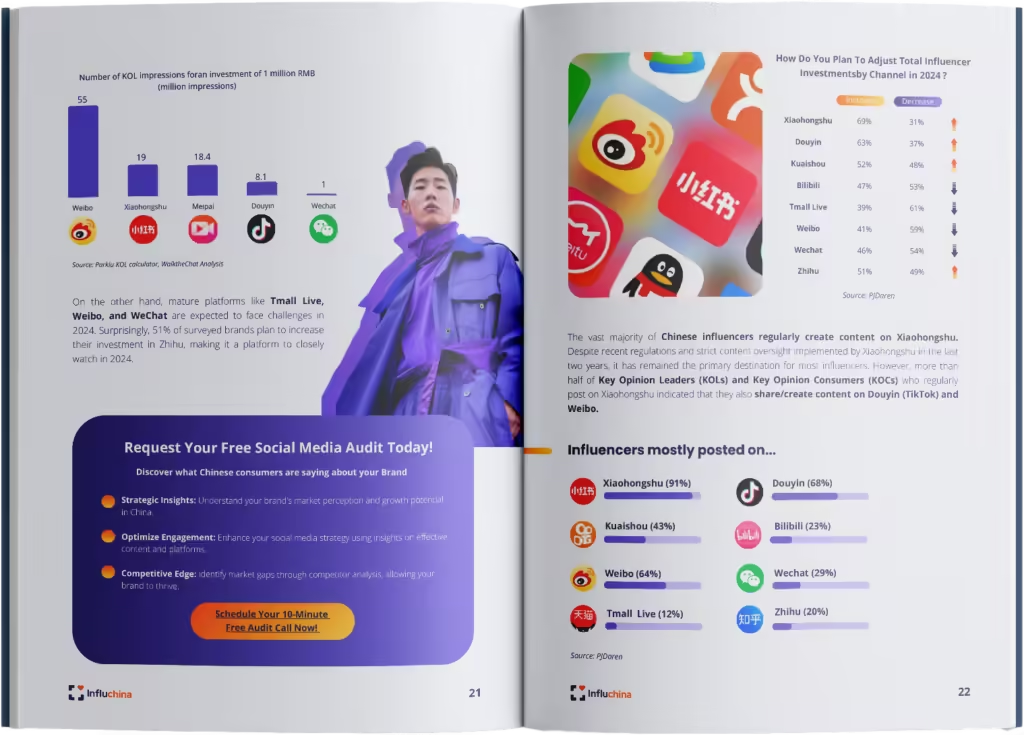TL;DR | Market Research in China
Conducting market research in China is essential for any brand aiming to enter or expand in the Chinese market. With over a billion consumers, diverse regional behaviors, and unique cultural and digital ecosystems, understanding local trends, competitors, and consumer preferences is key to success.
A solid China market research strategy helps companies make data-driven decisions, identify growth opportunities, minimize risks, and localize products and marketing campaigns effectively. Partnering with a specialized Chinese marketing agency ensures your research is accurate, actionable, and tailored to achieve measurable business growth in China.

Market research in China is crucial for understanding the trends and preferences of Chinese consumers, as well as the market’s challenges and opportunities. Therefore, market research in China is indispensable.
By conducting thorough market research, you can identify the needs and desires of consumers, understand the competition, evaluate the most effective marketing channels, and adapt products or services to meet the demands of the Chinese market.
Additionally, you can set clear marketing objectives and measure the performance of implemented marketing strategies when you do market research in China.
Market research in China is essential for making informed decisions on how to best enter and operate in the Chinese market, maximizing business opportunities.
1. Why You Need Market Research in China to Succeed
Conducting market research in China is essential for brands aiming to enter the Chinese market, as well as for considering the specific characteristics of a particular country or region.
In practice, market research in China helps you:
• Understand who your real target segments are by city tier, age, income, and region.
• Spot local trends and preferences before your competitors do.
• Avoid costly mistakes when entering, positioning, or localising your brand.
• Adapt your global strategy to China’s unique digital and cultural context.
China features a rapidly expanding economy, increasingly intense competition, significant regional and socioeconomic contrasts, and constantly evolving governmental regulations.
The Chinese consumer market is continuously evolving, with trends such as a growing demand for high-end manufacturing, green transformation, and an increasing preference for domestic brands over foreign ones. Understanding these trends through market research allows companies to align their products and marketing strategies accordingly.

Demographically diverse consumers in China
When entering the Chinese market, it is crucial to consider regional differences in economic and social development, which in turn affect consumption patterns and income levels.
Tier 1 vs. Lower-Tier Cities
Cities like Shanghai and Beijing (Tier 1) have a consumer profile vastly different from lower-tier cities. For example, Tier 1 city consumers tend to have higher income levels, greater exposure to international brands, and more sophisticated consumption preferences. In contrast, consumers in lower-tier cities might prioritize different product attributes and have distinct purchasing behaviors due to varying levels of economic development.
Regional Differences
There is also a significant variation between eastern regions and interior regions. The eastern regions, being more economically developed, exhibit consumption patterns closer to those in developed countries, whereas the interior regions are emerging markets with growing consumption power. This diversity necessitates that companies tailor their market research and strategies to these regional differences to effectively target and engage consumers.
Growing Importance of Interior Regions and Lower-Tier Cities
As interior regions and lower-tier cities gain economic strength, they are becoming increasingly important markets for foreign brands. The rising disposable incomes in these areas offer substantial business opportunities, making regional consumer segmentation crucial for maximizing market potential in China.
Cultural differences between China and the West
Guanxi
In China, “关系” refers to a system of personal relationships and social connections critical for achieving both personal and professional goals, so there are so much differences between chinese people and west people. This system is rooted in the concept of interdependence, where individuals assist each other based on their needs and connections. Guanxi emphasizes the importance of building and maintaining relationships, which can significantly influence business success in China.
Western Individualism vs. Chinese Collectivism
In contrast, Western societies often emphasize individualism and personal achievement. Success in the West is frequently associated with individual competition and self-reliance, which differs from the Chinese focus on collective relationships and mutual support. Understanding these cultural differences is vital for businesses to navigate and succeed in the Chinese market effectively.
2. When Should You Conduct Market Research in China?
The best time to conduct market research in China depends on the product or service in question and the specific goals of the research. Here are key situations when market research is recommended:
- When Launching Your Western Brand in the Chinese Market: Entering a new market requires a thorough understanding of local consumer behavior, preferences, and the competitive landscape. Market research helps identify the best entry strategies and positions your brand effectively to resonate with Chinese consumers.
- Introducing a New Product or Service: Before launching a new product or service, it is crucial to understand the demand, preferences, and potential reception among Chinese consumers. Market research provides insights into consumer needs, helping to tailor offerings to meet local expectations and ensuring a successful launch.
- Before Creating or Changing a Digital Marketing Campaign: The digital landscape in China is unique, with platforms like WeChat, Weibo, and Douyin (TikTok) playing significant roles. Conducting market research helps in understanding the most effective channels, content, and strategies to engage your target audience and achieve marketing objectives.
- During Periods of Market Change or Economic Shifts: The Chinese market is dynamic, with economic, regulatory, and consumer behavior changes occurring frequently. Conducting market research during these periods helps businesses stay informed about current trends and adjust their strategies accordingly to remain competitive.
- To Evaluate the Success of Existing Strategies: Regular market research is essential to assess the effectiveness of current marketing strategies, product performance, and consumer satisfaction. This ongoing evaluation allows businesses to make data-driven decisions and continually optimize their approach in the Chinese market.
In general, any time you are planning a major decision — market entry, new product, new campaign, or reacting to big market changes — you should treat market research as a mandatory step, not a “nice to have”.
3. Types of Market Research in China
Market research is an essential tool for any company looking to succeed in the Chinese market. There are different types of market studies that can be used to achieve your company’s specific objectives. Each has its own benefits and is used in specific situations. Here are the various ways market research can be conducted to gain valuable insights into the Chinese market.

Brand research
Brand research in China helps you answer: “What do Chinese consumers really think about our brand today, and how do we want them to see us in the future?”
Brand research is crucial for any company seeking to create or strengthen its presence in the Chinese market. It focuses on developing an effective brand strategy that leaves a positive and memorable impression on the target audience.
By conducting brand research, you can:
- Analyze brand awareness among the target audience.
- Measure customer loyalty to the brand.
- Identify qualities associated with the brand.
- Evaluate critical aspects of the customer-brand relationship.
This information helps in developing a solid brand strategy and maximizing opportunities for success in the Chinese market.
Consumer research
Consumer research in China helps you answer: “Who is my real target customer, how do they buy, and what motivates or blocks them?”
Consumer research aims to understand the preferences, behaviors, and needs of Chinese consumers. This type of research includes surveys, focus groups, and interviews to gather data on:
- Consumer buying habits.
- Product preferences.
- Motivations and pain points.
Insights from consumer research help companies tailor their products and marketing strategies to better meet the demands of Chinese consumers.
Market entry research
Market entry research in China helps you answer: “Is this market attractive for us, and what is the best way to enter it?”
Market entry research is essential for companies planning to enter the Chinese market. It involves analyzing the competitive landscape, regulatory environment, and market potential. This research helps in:
- Identifying potential barriers to entry.
- Assessing market demand for your product or service.
- Developing entry strategies such as joint ventures, partnerships, or direct investment.
| Type | Description |
|---|---|
| Brand Research |
Focuses on developing a strong and memorable brand presence in the Chinese market.
|
| Consumer Research |
Aims to understand Chinese consumer preferences, behaviors, and motivations.
|
| Market Entry Research |
Essential for foreign brands entering the Chinese market.
|
Competitive analysis
Competitive analysis involves studying your competitors in the Chinese market. This type of research helps in understanding:
- Competitor strengths and weaknesses.
- Market positioning of competitors.
- Pricing strategies.
By knowing your competition, you can develop strategies to differentiate your offerings and gain a competitive edge.
Digital market research in China
Digital market research in China focuses on online behaviors and trends. Given the importance of digital platforms like WeChat, Weibo, and Douyin (TikTok in China) in China, this research is vital for:
- Understanding digital consumption patterns.
- Evaluating the effectiveness of digital marketing campaigns.
- Identifying popular online platforms and content types.
Given the importance of digital platforms like WeChat, Weibo, and Douyin (TikTok) in China.

By leveraging digital market research, companies can optimize their online presence and engage more effectively with Chinese consumers.
Evaluation of marketing campaigns
Evaluation of marketing campaigns is an important way to measure the effectiveness of a company’s marketing strategies in the Chinese market. This type of research can specifically focus on analyzing the success of advertising campaigns by measuring parameters such as:
- Social media performance.
- Online sales.
This information is valuable for making adjustments and improving campaign performance, effectively reaching consumers, and keeping customer acquisition or sales costs low in the Chinese market.
Product development
Product development for the Chinese market requires a careful and well-planned approach. Before starting the development of a product, it is important to conduct market research in China to ensure that the product concept is valuable and appealing to Chinese consumers. This includes researching:
- Market trends.
- Consumer needs and preferences.
- Competition.
Once there is a clear understanding of the needs and preferences of Chinese consumers, the product development can begin. However, product development is not a static process, as consumer needs and preferences change over time. Therefore, it is important to maintain continuous communication with consumers and monitor product performance to make necessary adjustments and improvements.

Product development is not a static process, as consumer needs and preferences change over time
For example, a product might be very successful initially, but sales may begin to decline. In such a case, it is possible that consumer needs and preferences have changed, and the product needs to be improved or updated to remain relevant and attractive to consumers.
Usability testing
Usability testing is essential to ensure that products are easy to use and meet the needs of Chinese consumers. Similar to product development research, usability testing focuses on how consumers use the product and their experiences with it.
Usability testing can be conducted in various ways:
- Beta versions of mobile apps can be released to gather user feedback on any errors or issues.
- User tests can be conducted where consumers are invited to use the product in a controlled environment, and information about their experience is collected.
Usability testing in China is especially important due to cultural differences and differences in technology and devices used by Chinese consumers. Ensuring that the product is user-friendly and meets the needs and preferences of Chinese consumers maximizes the chances of success in the Chinese market.
Usability testing in China is especially important due to cultural differences and differences in technology and devices used by Chinese consumers
4. How to Conduct Market Research in China: Step-by-Step
To get reliable insights in China, it is not enough to run a few online surveys and call it a day. A structured process helps you combine the right methods and turn data into decisions:
1. Define clear objectives and hypotheses
Clarify what you want to learn: market potential, ideal customer profile, price sensitivity, brand perception, or product–market fit. Agree on success metrics and key questions before selecting any tools or agencies.
2. Segment by region and city tier
China is highly diverse. Separate Tier 1 cities (e.g. Shanghai, Beijing) from lower-tier cities and interior regions, as income levels, digital behaviour and brand awareness can be very different. Design your sample and questionnaires with these segments in mind.
3. Choose the right mix of research methods
Combine qualitative and quantitative approaches: depth interviews, focus groups, social listening, online surveys, platform data and competitive analysis. For many brands, this means pairing consumer research with market entry research and digital data from platforms like WeChat, Weibo or Douyin.
4. Localise your questionnaires and discussion guides
Questions must be written in natural, culturally appropriate Mandarin. Work with native researchers who understand nuances such as guanxi, collectivism and local slang, so respondents feel comfortable and answers are accurate.
5. Recruit the right respondents and partners
Ensure you talk to consumers who actually match your target audience in terms of city tier, age, income, and digital habits. For B2B research, involve distributors, retailers or industry experts who understand your category in China.
6. Analyse, localise and prioritise insights
Go beyond raw data and dashboards. Translate findings into clear implications for positioning, pricing, channels and communication. Highlight what is truly different about China compared to your home market, and prioritise 3–5 strategic recommendations.
7. Turn research into action with a concrete roadmap
Connect your findings to a practical plan: which segments to target first, how to localise your product, which platforms to focus on, and what tests to run in the next 3–6 months. This is often where a specialised agency like InfluChina adds the most value.
5. Key Benefits of Conducting Market Research in China
Beyond validating your ideas, market research in China becomes a long-term tool to stay close to consumers, reduce risks, and uncover new growth opportunities.
Market research in China is a crucial tool for any company seeking success in this market. Here are some of the key benefits your company can gain by conducting market research in China:
Maintain a consumer-centric approach
Market research in China is essential for creating a business or product that is centered on the customer. This includes understanding consumer needs and preferences to develop effective products and marketing strategies. By using segmentation, targeting, and positioning models, companies can identify the most profitable segments and develop strategies to meet their needs. This helps maximize success and profitability in the Chinese market.
Market research in China is essential for creating a business or product that is centered on the customer.
Connect effectively with your audience in China
Market research is crucial for connecting effectively with your target audience in China. This involves selecting the right marketing channels and tailoring marketing content to genuinely reach your audience. Choosing the appropriate channels and content maximizes the chances of success in the Chinese market.

Identify growth opportunities
Regular market research can help identify new opportunities for growth and improvement. Some potential discoveries include:
- Untapped Segments: Identifying market segments that could benefit from your products or services but are not yet customers. These could include consumers of different ages, genders, income levels, or geographic regions.
- Business Partnerships: Finding opportunities to partner with other companies that already have an established connection with your target audience. These partnerships can be mutually beneficial, expanding and strengthening your brand’s reach.
- Product Improvements: Uncovering potential weaknesses in your product or service, which, if addressed, can attract more customers and improve satisfaction. Identifying opportunities for add-ons, product bundles, or other upsells that align with customer preferences can also increase reach and profits.
Reduce risks by testing concepts
Market research in China is essential for minimizing risks and maximizing profits. Companies should use market research to predict whether a product concept has real potential for success and refine their strategy before the official product launch. Market research helps ensure there is demand for a product and prevents the failure of new products. Using market research strategically mitigates risks and increases the chances of business success.
Market research in China is essential for creating a business or product that is centered on the customer.
6. InfluChina: Your Market Research Partner in China
As a specialized marketing agency focused on China, we offer a wide range of services to help businesses succeed in the Chinese market.
Our Services Include:
- Market Research: Gain valuable insights into market trends, consumer preferences, and competitive landscapes.
- Market Insights: Understand the nuances of the Chinese market to make informed decisions.
- E-commerce Services: Optimize your online sales channels to reach Chinese consumers effectively through key platforms in the China Online Marketplace.
- Online Reputation Management: Build and maintain a positive brand image in China.
- Social Media Marketing: Leverage platforms like WeChat, Weibo, Xiaohongshu, Douyin (Tiktok) and Bilibili to connect with your audience.
We tailor our solutions to each company’s industry, goals, and budget. With extensive experience helping brands enter the Chinese market and a reliable network of collaborators, studying your market in China becomes much simpler with our support.
In summary, we are a full-service agency with deep knowledge of the Chinese market. Contact us to schedule a meeting and start your journey to success in China!

“At Influchina, we believe that successful market research in China starts with understanding people — their values, habits, and culture — not just the data.” By combining local insight with global expertise, Influchina helps brands turn market research in China into actionable strategies that drive real growth and long-term success.
FAQ
FAQs About Market Research in China
Why is market research in China so important?
Because China is not a single, homogeneous market. There are big differences between regions, city tiers, age groups and income levels, as well as unique cultural factors such as guanxi and collectivism. Market research helps you understand these differences so you can design the right products, messages and channels instead of simply copying Western strategies.
How is market research in China different from Western markets?
In China, regional and city-tier differences are more pronounced, the digital ecosystem is built around platforms like WeChat, Weibo, Douyin and Xiaohongshu, and cultural values are more collectivist. Relationship-building (guanxi) also plays a larger role. This means you need localised questionnaires, Chinese-language moderators and tools that are adapted to local platforms and behaviours.
When should I conduct market research in China?
Key moments include:
before launching your brand in China
before introducing a new product or service
before creating or changing major digital campaigns
during significant market, regulatory or economic shifts
and on a recurring basis to evaluate the performance of your strategies and products
Doing research only once at market entry is not enough – you need ongoing insights as the market evolves.
What types of market research are most useful in China?
The most common and useful types include:
Brand research – to understand awareness, perception and loyalty
Consumer research – to explore needs, preferences and purchase journeys
Market entry research – to analyse competition, regulations and entry options
Competitive analysis – to benchmark competitors’ strengths, prices and positioning
Digital research – to study online behaviour, platforms and content performance
Campaign evaluation, product development and usability testing – to optimise marketing and improve products based on real user feedback
How long does a typical market research project in China take?
Timelines depend on the scope and methods. A focused survey or qualitative study might take a few weeks from design to final report, while a broader multi-city, multi-method project can take several months. It is important to plan enough time for localisation, recruitment, fieldwork and proper analysis, rather than rushing for quick but shallow results.
Do I need a local agency to conduct market research in China?
While it is possible to run simple online surveys remotely, most serious projects benefit greatly from a local partner. A specialised China agency can help with sample recruitment, questionnaire localisation, moderation in Mandarin, understanding cultural nuances and turning results into actionable strategies for the Chinese market.
How much does market research in China cost?
Budgets vary widely based on methodology (qualitative vs quantitative), number of cities, sample size and whether you include in-depth sessions like focus groups or usability tests. Smaller targeted studies are relatively affordable, while large multi-city projects require a more substantial investment. A good rule is to see research as part of your overall market entry or campaign budget, not as an optional extra.
What are common mistakes foreign brands make with market research in China?
Typical mistakes include:
treating “China” as one market without segmenting by region or city tier
translating Western questionnaires directly without localisation
relying only on desk research and platform data without talking to real Chinese consumers
running one-off studies and then never updating them
failing to connect research findings to concrete decisions on product, pricing and channels
Avoiding these mistakes will make your research far more valuable.
How can InfluChina help with market research in China?
InfluChina combines local expertise in Chinese consumer behaviour, digital platforms and influencer marketing with structured research methodologies. The team can help you design and run brand, consumer, market entry and digital research projects; interpret the results in context; and build an actionable plan that covers e-commerce, social media and influencer strategies for China.

